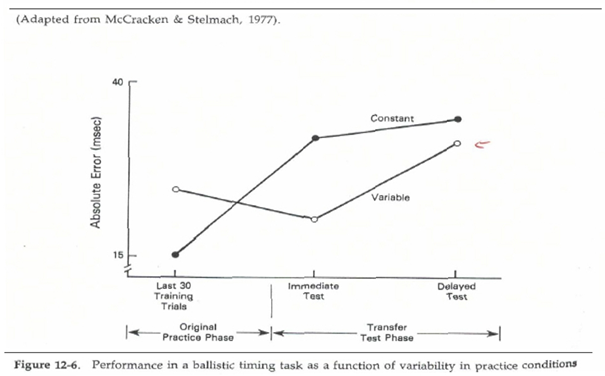Variable learning and transfer
Transfer means that the information absorbed during the learning phase must be permanently stored. When the same or a similar task needs to be solved, this information can then be retrieved. Many studies have shown that the success of transfer is highly dependent on the learning conditions.
Content
The real magic word in learning is transfer : the information absorbed during the learning phase must be permanently stored so that it can be retrieved when solving the same or a similar task. However, this transfer is a complex process that does not necessarily occur during the learning phase. It is subject to its own laws, which are also related to the enormous interconnectedness of the brain.
The question now arises as to whether certain learning conditions can enhance transfer and thus lead to better learning success for the same amount of practice time. In fact, many studies have shown that learning success directly depends on the learning conditions. Even though there are differences in existing learning performance, repetitive learning in particular seems to lead to much lower learning success than expected.
Repeated problem solving
In the chapter on intrinsic and self-organized learning, the learning process is described as repeated problem solving. Schmidt (1975) defines learning not as "frequent repetition of the solution" to a specific motor task, but rather as "repeated search for the solution to a specific motor task". This applies not only to motor learning, but also to process learning in general. As a consequence of this concept, variable learning, in which different tasks or sequences of tasks are randomly selected, was considered necessary.
In a study by McCracken & Stelmach, the main advantage of variable practice was demonstrated by 48 students while moving the target to points at different distances. The duration of the movement was always constant at 200 ms. The constant group practiced only one distance, i.e. repeated the same task over and over again, while the variable group practiced 4 different distances. In a mid-test and a post-test, transfer performance was tested for a new distance that had not been previously practiced.

Success of learning by doing variable
As can be seen in the figure, the constant group (filled dots) performed better during the training phase with a lower absolute error, which is justifiable because their task was repeated only once. The variable group (open dots) performed worse during the training phase but had significantly better transfer performance. The level of performance during the training phase was thus completely reversed during transfer.
The difference in transfer performance decreased again after two days, which was interpreted as a decline in memory performance. In general, it could be shown that repetitive practice leads to significantly lower transfer performance than variable practice.
Frequent practice and amount of learning are therefore very important for successful learning, but the same thing should not be repeated over and over again. Instead, the exercise task should always impose new demands on the learning system. The learner should not be under-challenged by the task, but of course not over-challenged either. The importance of this optimal level of learning is described in more detail in the chapter on "The Challenge Point".
What does this mean for my teaching practice?
Not only the frequency of practice is important, but also the learning conditions. While "repeating the solution several times" to a given task leaves little imprint on the brain, and "repeatedly searching for the solution to a given task" activates the learning system, then it is a good idea to always vary the learning task slightly to achieve better success in learning.
Reflection question
Why is problem solving a good exercise condition?
Quiz
1) Intrinsic and self-organised learning can be promoted through
A) variation of learning tasks
B) frequent repetition
C) precise instructions for practice